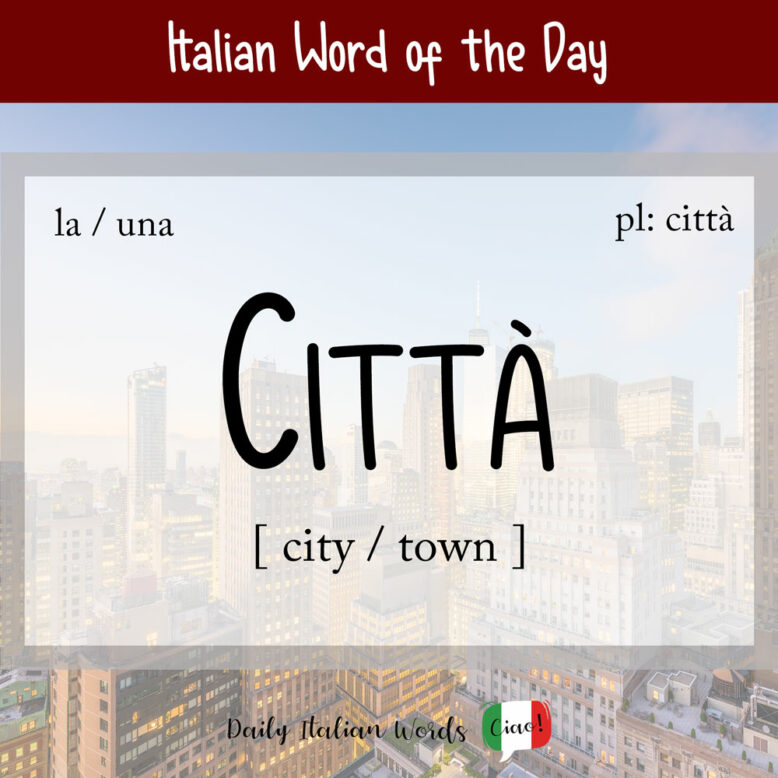The word for a city in Italian is città. It is derived from the Latin civitatem, a derivative of civis meaning “citizen“. It generally refers to any human settlement of considerable size with streets, public services, and a local administration.

Because it is an invariable feminine noun, the plural form is the same as the singular form. Here are the definite and indefinite articles it takes:
- la città = the city
- le città = the cities
- una città = a city
- (delle) città = (some) cities
There are various adjectives you can use to describe a città such as: grande (big), piccola (small), antica (ancient), moderna (modern), ricca (rich), povera (poor), abitata / popolata (populated), and scarsamente abitata / popolata (largely unpopulated).
Non mi piace vivere in città. Preferisco la campagna.
I don’t like living in the city. I prefer the countryside.
Some of the most well-known cities in Italy include:
- la città di Milano = the city of Milan
- la città di Roma = the city of Rome
- la città di Firenze = the city of Florence
- la città di Napoli = the city of Naples
- la città di Torino = the city of Turin

What is interesting about the word città is that it can also translate as “town” in specific terms and expressions, even if the town in question isn’t particularly large or populated.
- città natale = hometown
- città di mare = seaside town
- essere in città = to be in town
- essere fuori città = to be out of town
This is especially true when it is used figuratively to refer to actual inhabitants of a town or city, rather than the place itself.
Tutta la città sa come sono stati spesi quei soldi.
The whole town knows how that money was spent.
Important: The most common translation for town is paese, a word which, somewhat confusingly for learners of Italian, can also mean country! We discuss this topic in-depth in our article about the word paese if you’d like to know more.
Derived from città is the diminutive form cittadina which literally means “small city”, so in actual fact, it is yet another translation for “town”. For a town or city to be classified as a cittadina, it should be rather small in size but with certain administrative or cultural importance and a population of 10,000 to 50,000 people.

Sometimes città can even mean district or quarter when referring to a specific area of a city or town. For example, the old quarter of a town is called la città vecchia whereas the Olympic district is known as la città olimpica.
Finally, città is used in various expressions to describe Italian cities, as well as other things such as the heaven:
- la città eterna / la città dei Cesari = Rome (lit. eternal city / city of the Cesari, in reference to the various emperors of the Ancient Rome)
- la città della Mole = Turin (the Mole Antonelliana is a tower and one of the main symbols of the city)
- la città della Madonnina = Milan (in reference to the small Madonna golden statue on the Duomo cathedral)
- la città delle due torri = Bologna (in reference to the city’s towers)
- la città del santo = Padua (in reference to Anthony of Padua)
- la città del fiore = Florence (the city’s symbol is a flower, the giglio, aka lily)
- la città di Dio = heaven / paradise
- una città fantasma = a ghost town
- una città morta = an abandoned city
Heather Broster is a graduate with honours in linguistics from the University of Western Ontario. She is an aspiring polyglot, proficient in English and Italian, as well as Japanese, Welsh, and French to varying degrees of fluency. Originally from Toronto, Heather has resided in various countries, notably Italy for a period of six years. Her primary focus lies in the fields of language acquisition, education, and bilingual instruction.


